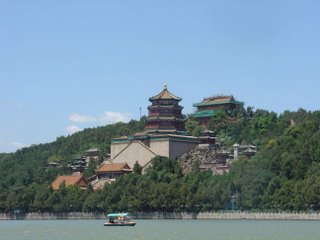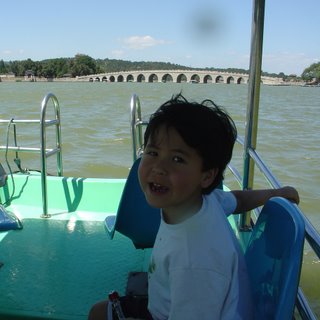 Postcard from Beijing
Postcard from BeijingWe got into Beijing airport late afternoon, where Mark, his son David and a driver met us. The hotel Mark and his wife XinHong had booked for us near the third-ring road was the first nice surprise, meeting their friends Jin and Xiao Hua the next one. Friday we took a taxi to our first tourist attraction, spending a really lovely blue-sky day on the lake at the Summer Palace. In 1880 the Dowager Empress Cixi diverted the country’s naval modernization fund to construct an elaborately landscaped paradise, with the probable effect of helping China lose the war against Japan two decades later. But it’s a beautiful place, and who really needs a navy anyway? We rented our own boat.
Temple of Buddhist Virtue, Summer Palace

Near the Phoenix Isle, Kunming Lake, Summer Palace

David finally overcomes hydrophobia. 17-arch bridge is in background.
 Beijing to Shanghai
Beijing to ShanghaiOur host Xiao Hua cannot join us for our trip to the south—it’s an important time of year. He works for the publishing company that prepares the nationwide achievement tests. Experts from every area are coming to the office each day—it’s all very secret, as you might imagine. Xiao Hua is kind enough to drive us to the Beijing station where we will take the train to Shanghai. The six kilometer trip takes an hour and a half. Oh, no, they say, this is actually quite good. At least we are moving. While we move we are listening to drivetime radio, “Lite rock, Beijing’s only bi-lingual radio station” where an American male and Chinese female discuss endless matters of morality—how we ARE, what we are BECOMING, how we should BEHAVE. Today we’re talking about how you act during the commute. Do you talk to strangers, and if so, why? Call us or text message us now…Another thing that just bugs me is BAD BOOKS. Why should we waste our time reading books that don’t mean anything or are written badly, just because they are popular? Also, in the news—students are upset at the government requirement that they present evidence of employment as a requirement for graduation. Are they right?” From where we are dropped off we cross an enormous concrete walkway to the central hall of checking tickets, a cavern filled with thousands and thousands of people sitting and sleeping and playing card games on the floor. It’s a 12 hour ride to Shanghai.
Postcard from 上海
For me personally, Shanghai is a transformative experience. We had been given clues in Beijing, where construction cranes are seen in every direction, traffic and pollution and changing attitudes making your eyes sting. Shanghai is a transformative experience for Shanghai itself, a 24 hour total immersion spectator sport. Around us a cityscape of twisted vitality, buildings of every kind, the very old sinking beneath the elevated expressways, decrepit seventy-story residential towers towering above, each containing thousands of apartments all with laundry strung across their windows, each with an ancient air-conditioner cantilevered outside, a neon light facade outlining the penthouse heights. Did I mention it’s hot? And in every direction the very new, wild swooping post-modern architecture proclaiming the victory of capitalism.
That evening Ted, the husband of Mark’s business associate Sandy takes us to visit “the Bund.” It’s the section along the bank of the Huangpu river that was established as a trading zone for foreigners in the late 1800s. Ted edges the van into an underground parking garage along the river’s edge, backing in beneath the portholes. It’s suffocatingly hot, the garage no more than twenty feet wide, an eight foot ceiling, filled with the muffled din of people and cars, the stink of people and exhaust fumes. We elbow our way out into the crowd and work our way up onto the embankment, where a light, hot, monsoon sprinkle is beginning to fall. “Hold on to your purses,” Ted warns.
In the 21st century, two free trade zones have been established on the other side of the Huangpu, in the Pudong district, connected to the old city by a high-speed magnetic levitation train. Most of the Fortune 500 companies have presences here. It’s awesome, you have to say. Science-fiction towers line the river, bizarre in shape, glittering with neon advertising, the moving images of golden tropical fish swimming in an a virtual aquarium displayed on the curved face of a hundred story building. In the river itself, excursion boats outlined in neon cruise back and forth.
Somehow I was too knocked out to take any pictures myself. Here's one from Wikipedia that just absolutely fails to do justice to the place:

Shanghai to HangzhouThe early train from Shanghai to Hangzhou is full—the computer offers only standing tickets to this famous city—we have to wait until 9:40 for a seat. It’s advertised in the guidebook and schedule as a two hour ride, but for us it takes three, without any stops or delays. We have a pleasant ride chatting with a couple of American guys, MBA grads from MIT who are on a sojourn before reporting to work at their respective consulting companies. They’ve been all over China already, Hong Kong, a rafting trip through the Three Rivers gorge. They’re on their way to Mongolia after Hangzhou, will end their travels in Tibet. They pass on the news from home—George Bush has used his first veto to oppose stem-cell research, provide an interesting hawkish perspective on the Israel’s defensive operations against Hezbollah in Lebanon. It’s a little bit different view than that presented by the Chinese government a few days later—the PRC disapproves highly of the killing of their UN observer by an Israeli fragmentation bomb.
It’s hot, hot, steamy, and strangely barren at the railway depot in Hangzhou. Fortunately I had been able to buy a map of the city on the train, and without much difficulty I’m able to locate the pinyin street name Hongxia Tang has spelled out over the phone from the hotel the night before. Yes, it’s true, I went to China without writing down the address of the office. Little details like that can sometimes make travel in foreign countries difficult. Considering my dismal track record in navigating to the office in Campbell, you’d think I would have been a little more careful. But a half hour later our taxi comes across the silvery expanse of the river, turns left, and we arrive in front of the Innovation Building and take the elevator to the seventh floor. Yu-min convenes an all-hands meeting of the office to greet us visitors. He presents the current projects and I describe a little bit about our QA and production process in Oakland. It’s a great honor to be able meet all the engineers and staff individually—I may not remember 100% of the names, but I heard all the stories-- there’s a lot of exciting stuff being done there, work on China Search for which a pretty good index is already available, very interesting developments in incremental indexing and a history db that will allow us to keep track of that process, a demo of local search capabilities for mobile devices. And a lot more. The team in Hangzhou is already experiencing a space crunch. Here we all are, posing in front of the office. That's my beautiful wife Vickie and friend Mark in the center:

It turns out that the West Lake in Hangzhou was the model for Dowager Empress Cixi’s new Summer Palace in Beijing, which we’d seen a few days before and I wrote about above. This lake is far larger, much older, extraordinarily beautiful. Fortunately we were able to pick up a nice tourist book on the lake—the photos I took don’t let you see much through the afternoon haze. Those are our designated tour guides from the Ask office, Yi Li and LiJuan Feng, who were kind enough to show us around the older part of the city, where we bought some of the local tea. LiJuan effortlessly bargained on Mark’s behalf to buy a silk shirt in one of the shops. A pretty good deal at 50 Yuan (a little over 6 dollars). Later they took us for a walk along the Bai Causeway that divides the Lake and selected a great nearby restaurant for a meal before we headed to the airport that evening. A little over two hours later, catching an earlier flight than the one we were scheduled on, we were back in Beijing.
A boatman rows along the Bai Causeway, West Lake, Hangzhou

Bill, LiJuan, Mark, and Vickie, West Lake, Hangzhou

26July06--Back in 北京 (North Capital, Beijing)
The Chinese believed that Heaven is round and the earth is square and constructed their city to match this concept. To the south of Tiananmen is the Heavenly Palace park, where the Temple of Praying for Bumper Crops, a circular three-tiered tower 39 meters tall that rises above a raised, square stone altar. Here, after a period of fasting, the emperors presided over annual animal sacrifices. They still pray for plenty here—only the animals have changed.
Earlier our taxi deposited us at the edge of Tiananmen, and we strolled across its vast white stone expanse toward the entrance to the Forbidden City, surrounded by thousands of fellow tourists and overlooked by the impassive portrait of Mao. A few minutes and 15 yuan later we were standing in the exact spot where the chairman declared “Mission accomplished” in 1948. Who could predict that nearly sixty years later the revolution would still be going on?
In Shanghai we picked up a book called “Red-color News Soldier,” a photo essay by Li Zhensheng, who was a newspaper photographer during the Cultural Revolution in the 60’s. Chilling. Picture after picture of “landlords,” “bad characters,” and “speculators” being called to account by the malicious zealots of the Red Guard, made to stand on chairs with their heads bowed for hours before jeering crowds, their faces smeared with black ink, forced to wear pointed dunce caps. One particularly shameful photo shows a group of Buddhist monks posed in front of their vandalized temple holding a sign reading “To hell with the Buddhist scriptures. They are full of dog farts.” It’s still notable that the National History Museum in Beijing, which we visited yesterday, contains not a single religious artifact.
(It's probably not really fair to focus on the past this way--there are still a lot of aspects of secular authoritarianism in China, but things have moved on--there're a dozen or so mosques in the capital city, we visited the Buddhist Lamasary and Confucious Temple, a lot of religious and political toleration.)
 Postcard from Beijing
Postcard from Beijing







No comments:
Post a Comment